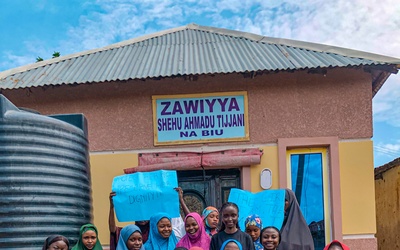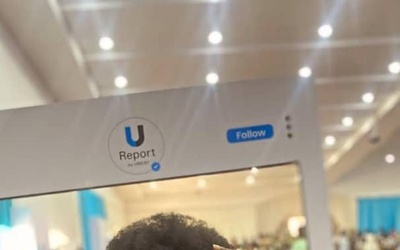Millions of children suffer violence every year in Nigeria - approximately 6 out of every 10 children under the age of 18 years experience some form of physical, emotional and sexual violence before the age of 18 years, according to the Nigeria Violence Against Children Survey, carried out by the National Population Commission, with support from UNICEF and the US Centers for Disease Control and Prevention.
Announcing the launch of the year-long campaign to end violence against children, the President said “This is a historic day. A day when Nigeria stands up and says to our children - we commit to protecting you from violence.”
The survey found that one in two children experience physical violence; one in four girls and one in ten boys experience sexual violence; and one in six girls and one in five boys experience emotional violence. The majority of children do not tell anyone what has happened to them and fewer than five per cent receive the help they need to recover.
“These findings are an urgent call to action not only for the Government, but also for civil society organisations, religious and traditional groups, the media, the private sector, communities, parents and families to come together to tackle violence against children,” the President added, pledging the full commitment of the Government of Nigeria during the campaign and beyond to tackle violence against children.
To develop a robust response plan to the findings of the survey, the Federal Ministry of Women Affairs and Social Development has brought together representatives from key Government Ministries, Departments and Agencies, as well as Civil Society and Faith Based Organisations.
“The Government of Nigeria and its partners are to be congratulated on their commitment to end violence against children” noted UNICEF Nigeria Representative Jean Gough. “UNICEF will continue to support Nigeria in its efforts to ensure that children are protected from sexual, physical and emotional violence”.
“We have made progress in this fight but much still remains to be done” added U.S. Embassy Chargé d’Affaires, ad interim, Maria E. Brewer. “All children must be protected from abuse, violence, exploitation and neglect. Violence against children is never justified. Violence is preventable.”
***
For further information, please contact:
Angela Agoawike, Communication Consultant, UNICEF Tel: 0802 410 1006, email: aagoawike@gmail.com
Geoffrey Njoku, Communication Specialist, UNICEF Tel: 0803 525 0288, email: gnjoku@unicef.org
Launch of the Year of Action to End Violence Against Children- by Jean Gough, UNICEF Representative
It gives me enormous pleasure to address you today at the launch of the Year of Action to End Violence Against Children.
Last week, the Government of Nigeria released the findings of the National Survey on Violence Against Children – the first survey of its kind in Nigeria.
The Government is not only to be congratulated for undertaking this groundbreaking survey, but also for making the findings widely known, shining a spotlight on what the survey shows is a significant problem in Nigeria.
The survey found that violence impacts millions of children’s lives every year across Nigeria. You cannot help but be shocked by the huge numbers of children experiencing violence. But sometimes we can get lost in the statistics. Let’s remember that each statistic represents an individual child suffering violence – a four year old boy being intentionally burnt for misbehaving, a 13 year old girl being repeatedly raped by her neighbour, a 7 year old being told again and again – “you are worthless, I wish you were dead” by their own mother.
Also, when many people think of physical, sexual and emotional violence against children, they think of it as happening to someone else, to someone’s else’s family and in someone else’s community. But the Survey findings are clear – violence against children is a problem that transcends social and economic status. It impacts rich and poor, urban and rural, educated and out of school children. The findings of the survey highlight that violence is not confined to poor families, nor to marginalised children or children living in the shadow of conflict.
Violence against children is not somebody else’s problem, it is everyone’s problem.
Today, the Government of Nigeria, at the highest level, is committing to take action to end violence against children. The President is to be congratulated on this highly significant commitment. However, the launch Year of Action to End Violence Against Children not only recognizes the fundamental role that the Government at Federal and State level has to play in preventing and responding to violence, but the critical role that all Nigerians have in ending violence against children.
UNICEF has been proud to support the Government in undertaking the national survey and is enthusiastically supporting the Year of Action to End Violence Against Children. UNICEF renews its commitment to support Nigeria to implement the Priority Actions during the coming year and beyond.
When we leave the venue today, I hope that each and every one of us - government, non-government organisations, religious and traditional leaders, UN agencies and development partners, the media, as well as communities, families and children - will leave with absolute commitment and energy to take action to ensure that all children in Nigeria can grow up free from violence.
It’s time to take action!
Together, let’s end violence against children
#EndViolenceAgainstChildrenNigeria
Facebook: NGEndviolenceagainstchildren








